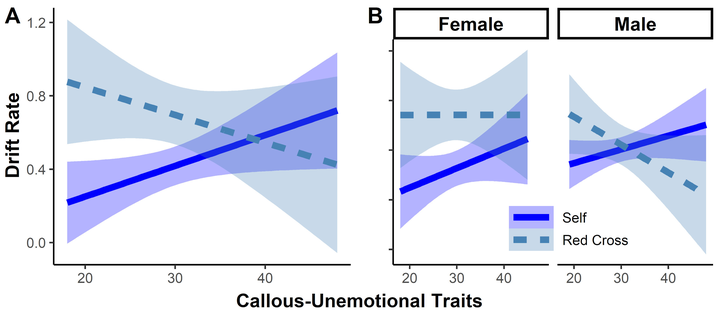Cognitive Mechanisms Underlying Prosocial Decision Making in Callous-Unemotional Traits

Abstract
Callous-unemotional (CU) traits are characterized by a lack of prosocial emotions, which has been demonstrated with prosocial behavior paradigms. While shaping our understanding of prosocial behavior in youth with CU traits, most of this work relies on outcomes that don’t reliably capture cognitive processes during prosocial behavior. Examining prosocial cognitive processes can cue researchers into cognitive mechanisms underlying core impairments of CU traits. Drift diffusion modeling is a valuable tool for elucidating more precise outcomes of latent cognitive processes during forced choice tasks such as drift rate (information accumulation toward a decision boundary) and threshold separation (amount of information considered) as well as metrics outside of the decision-making processing including bias (starting point in decision process) and non-decision time (cognitive processes outside of choice). In a sample of 87 adolescents (12-14, 49% female) we applied diffusion modeling to a prosocial behavior task in which participants either accepted or rejected trials where a real monetary value was given to them and taken away from a charity (self-serving trial) or money was given to a charity and taken from them (donation trial). Results revealed that CU traits associated with information accumulation toward accepting self-serving trials. Exploratory sex differences suggested males trended toward rejecting donation trials and females considered more information during self-serving trials. CU trait associations were independent of conduct problems. Results suggest a unique cognitive profile that are differentiated by sex at higher CU traits when making prosocial decisions involving knowledge accumulation toward self-serving decisions.
Citation:
Winters, D. E., Pettine, W. W., & Sakai, J. T. (2022). Cognitive mechanisms underlying prosocial decision making in callous-unemotional traits. Journal of Psychopathology and Behavioral Assessment.